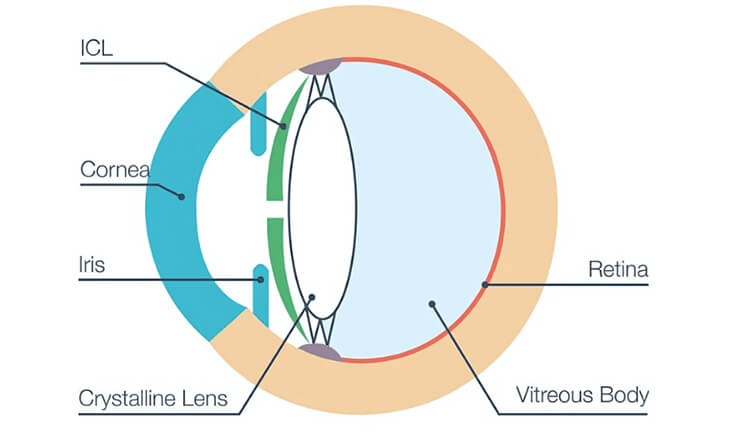Implantable Contact Lenses: Everything You Need to Know
Are you struggling with vision problems but not convinced about laser surgery?
If laser eye surgery isn’t an option for you, there’s another revolutionary solution—Implantable Contact Lenses (ICLs). This advanced technology provides a permanent, safe, and highly effective alternative for vision correction. Whether you have severe myopia, astigmatism, or other refractive errors, the implantable contact lens procedure could be your gateway to a life free from visual limitations.
Let’s learn more about them.
What Is an Implantable Contact Lens?
An implantable contact lens is a thin, biocompatible lens placed inside the eye, between the iris and the natural lens, to correct vision. Unlike traditional contact lenses that sit on the cornea, ICLs are implanted surgically and remain in the eye indefinitely. They function like an internal contact lens, working in harmony with your natural eye structure.
Unlike LASIK or PRK, which permanently reshape the cornea, ICLs provide a reversible solution. If needed, they can be removed or replaced without altering the eye’s original structure. This makes them an excellent choice for people with thin corneas or high refractive errors who may not qualify for laser eye surgery.

The Implantable Contact Lenses Procedure: How It Works
The implantable contact lenses procedure is quick, painless, and performed under local anesthesia. Here’s what you can expect:
- Pre-Surgery Evaluation – A comprehensive eye exam determines the suitability for implantable contact lenses. This includes measuring corneal size, anterior chamber depth, intraocular pressure, and visual acuity.
- Lens Customization – The lens is custom-designed based on individual vision needs and eye measurements.
- Micro-Incision Placement – A small, self-healing incision is made in the cornea, through which the lens is inserted and positioned between the iris and natural lens.
- Recovery and Adjustment – The procedure typically takes 15-20 minutes, with most patients experiencing significant vision improvement within 24-48 hours.
Who Is a Good Candidate for Implantable Contact Lenses?
If you have been told that LASIK isn’t suitable for you, implantable contact lenses might be the best alternative. You are a potential candidate if you:
- Have moderate to severe nearsightedness (-3D to -20D)
- Have thin/ steep corneas or dry eyes that make LASIK unsuitable
- Are between 18-40 years old with a stable prescription
- Prefer a reversible vision correction procedure
- Want a long-term solution without daily maintenance like traditional contacts
Benefits of Implantable Contact Lenses
- Superior Vision Quality – ICLs provide sharper, high-definition vision without causing glare or halos, commonly associated with laser surgeries.
- Reversible and Adjustable – Unlike LASIK, implantable contact lenses can be removed or replaced as technology evolves or vision changes over time.
- Preserves Corneal Structure – No thinning or reshaping of the cornea is required, making it a safer option for many patients.
- UV Protection – The lenses come with built-in UV protection, safeguarding the eyes from harmful radiation.
- Minimal Dry Eye Risk – Since the cornea remains untouched, ICLs reduce the chances of post-surgical dry eye syndrome.
Risks and Considerations
Although the implantable contact lenses procedure is highly safe, as with any surgical intervention, it does carry minimal risks, such as:
- Increased intraocular pressure (preventable with routine check-ups)
- Cataract formation in rare cases
- Infection or inflammation (though extremely rare with proper post-op care)
Post-Procedure Recovery and Care
The recovery process is smooth and fast. Most patients resume normal activities within a couple of days. However, some essential post-op care tips include:
- Using prescribed eye drops to prevent infection and inflammation
- Avoiding rubbing the eyes or engaging in strenuous activities for a few weeks
- Preventing water or anything else to go inside the eye
- Attending follow-up visits to monitor healing and vision progress
Choosing the Right Eye Doctor in Delhi for Implantable Contact Lenses
Selecting an experienced and skilled ophthalmologist is crucial for a successful outcome. If you’re considering implantable contact lenses, consult Dr. Anisha Gupta, a leading eye doctor in Delhi with extensive expertise in advanced vision correction procedures. With a track record of successful implantable contact lens surgeries and a patient-centred approach, Dr Gupta ensures you receive the highest standard of eye care.
Schedule a consultation today and take the first step towards a life without visual limitations!

